Native Chicagoan Barry Saltzman has received three Scenies, for his powerful work in Letting Go (Outstanding Achievement By A Featured Actor In A Drama) and as a member of the ensemble casts of Breaking The Code (Best Ensemble/Drama) and Amadeus (Outstanding Acting In An Ensemble Cast/Drama). The L.A.-based actor is about to open in West Of Broadway’s revival of Abby Mann’s Judgment At Nuremberg, a guest production at the Santa Monica Playhouse, in the role which won Montgomery Clift his final Oscar nomination. Barry took time from his busy rehearsal schedule to sit down and answer questions about (among other topics) becoming Mike Brady, stepping into Bennett Cerf’s (or Dorothy Kilgallen’s) shoes, recurring on one of TV’s most popular soaps, and what it’s like to work opposite Butch Cassidy And The Sundance Kid’s Etta Place.
Growing up in Chicago, how did you first become inspired to become a performer?
I always remember having loved show business and its history and I watched a lot of TV and old movies. When I had the opportunity to perform, I leaped at it, in both classes and in high school plays, so I could play and explore and show off what I knew … or thought I knew.
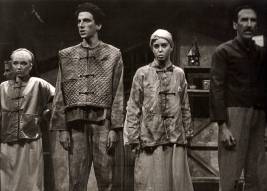
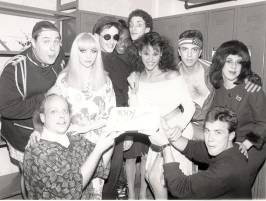
A couple of Barry’s early Chicago roles, 2nd from left in The Good Woman Of Szechwan and top center in Vampire Lesbians Of Sodom (with Alexandra Billings and Jackie Hoffman).
What kind of roles did you play as a young actor in your 20s?
It’s funny you ask me about my 20s, because that’s how long I was in Chicago, give or take. I was very fortunate that I worked at a lot of different theaters in a lot of different parts, both in terms of size and range.
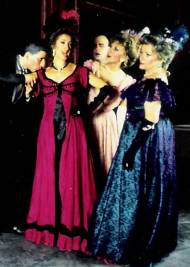
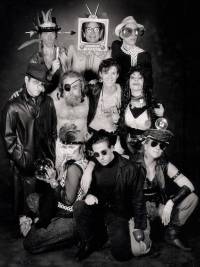
Barry in operetta mode, kissing the arm of The Merry Widow, and (with arrow through head) in Riders Of The Purple Wage
Can you give some examples?
I played in operetta, improv, Jean Genet, Tom Stoppard, Woody Allen, John Guare, Charles Busch and Neil Simon, among many others.
Is there any one of those that stands out in particular?
The one that stands out is probably In A Northern Landscape by Timothy Mason. One of the three best productions I’ve ever been in to date.
What made that experience stand out for you?
We had such a strong sense of ensemble in our show and I knew that we were a part of something special. Two happy by-products of that experience were that Andy Dick and I met during that production, and the great actress Barbara Harris saw our production, and heaped us with high praise. After that, I thought I could die, because she gave us her stamp of approval. And her comment was a validation of a high order. It’s nice to get those every once a while. To let us know that we’re on the right track and that all of our hard work pays off eventually.
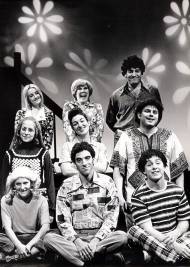
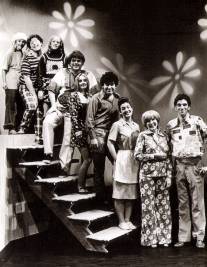
Barry as Mike Brady in The Real Live Brady Bunch
You toured nationally in The Real Live Brady Bunch recreating the iconic role of Mike Brady. What was it like stepping into Robert Reed’s shoes?
I had so much fun working on that, not only because growing up I loved the show, but also because Robert Reed was so effective and simple and seemingly effortless in that part that it was fun to attempt to do what he was doing. And playing a warm father figure both literally and figuratively is always fun, to me anyway. And to do a theatrical tour was so much fun—living the actor’s dream of getting paid well to visit different parts of the country and playing in beautiful theaters to receptive audiences.
What would you say was your best memory of the tour?
The best memory was at the Kennedy Center in Washington, DC. On our opening night, the house was full. Our producers were there, the press, various muckety-mucks. During the start of the show, a baby kept crying … incessantly … and I could sense that we were losing the audience, on Opening Night yet! So when we were doing our scene, I thought I needed to say something to bring the audience back, so I found an opportune time to break the fourth wall and say “Would you please take your baby out of the theater?”
That must have been a wild moment! Did it work?
The audience applauded as one and we got their attention back.
Perhaps more actors should follow your example!
I could get away with that in that show, since the show had an air of vaudeville and in a more quote-unquote legitimate show, it might be more difficult to do that.
I take it the woman did leave the theater with her crying baby.
I found out later that the ushers were trying to escort the mother and her baby out of the theater and she refused. But after I said my piece, the ushers were able to escort her out. That was, to me, a fun and powerful moment. To be able to trust my instincts to make it work out for us all.
Any moment in the tour that stands out as the worst?
The worst moment was when we were in Boston. During one of the shows, the Brady family are painting the parents’ bedroom. We all had various paint brushes and rollers as props. I used the roller suggestively vis-à-vis Greg and I. I thought it was funny and the audience did, too. We were a very gay-friendly show. I think that’s one of the facets that made the show so popular. But the Boston Globe critic thought that I was making fun of Robert Reed, since he had died of AIDS.
Ouch!
I was angry about that, since I’m gay myself, and neither the cast nor I would make fun of anybody who died of AIDS. And I’ve had friends that have died from AIDS, too. So I wrote a letter to the editor saying pretty much that, I asked the cast to sign it, and they graciously agreed. It didn’t see print, but it worked out anyway, since an audience member wrote a similar letter, so our point was made. The critic’s comment upset me, but that’s another thing I learned on tour: everybody has an opinion, both good and bad … and roll with the punches.
When and why did you decide to make the move out West?
I was touring in the Brady show and I had long wanted to make the move to L.A., but I was too scared. But I felt that I had reached a glass ceiling in Chicago. The show had boosted my confidence, I was ready for TV and film work, and due to the tour I was smitten with wanderlust, so I thought if I don’t move now, it’ll never happen. I stayed with Andy Dick for a while on one of the hiatuses from the show to see if L.A. and I fit, and we did, so I moved here.
Of the stage roles you’ve played as an L.A.-based actor, which ones stand out for you?
I’ve had the good fortune here to play a wide range of parts by a wide range of authors. But playing Joe in The Shadow Box at the Attic Theatre meant so much to me. That was probably, to date, the best production I’ve ever been in.
I saw it, and both the production and you were superb!
Thanks so much for saying that! The writing gave me the performance. It was cast so well, and the cast’s energy and talent was magical. That was another time that we knew we were part of something special. I was scared to death, because I needed to reach the other actors’ levels. It’s so great to work with people that are as good and better, so I decided to work through my anxiety and reach higher, and that made me a better actor. And it dealt with universal themes: love, loss, acceptance. I felt like I was paying tribute to my working-class maternal grandfather playing Joe. That production is so close to my heart.
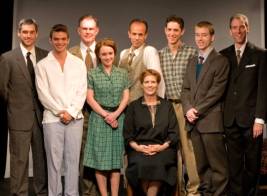
Barry (far right) and the cast of Breaking The Code
Do you have another favorite?
Breaking The Code at The Production Company is in my top three as well. We were again blessed with a magical cast and terrific director, Robert Mammana. And I was again having anxiety attacks about matching the level of the cast, as well as playing a man who’s totally in control and at ease with his power. I wasn’t at the time, but that part allowed me to feel that way both on stage and in life. What a breakthrough that was.

Barry (2nd from left) and castmates in Amadeus
Your work in The ProdCo’s Amadeus was pretty special too.
Thank you! Amadeus at The Production Company was a very wonderful experience, both artistically and personally. My most recent choice would be going on as one of the leads in The Limitations Of Genetic Technology at Theatre Of NOTE this past December.
That wasn’t the only part you were understudying, right?
Yes, I also understudied an ensemble part, so I had a lot to learn. And as one of the leads, my on-stage rehearsal time amounted to about 2½ hours. I prepared and worked on my own and I saw the show about once a week and knew what the part required, so I was ready when the time came to do my one and only performance.
What did you take away from that experience?
I learned so much from that: how to lay the foundation of preparation on my own and work through other issues—the anxiety, nerves, comparison to the other actor, thinking about what the other actors will think. But I was disciplined in my preparation, and being adequately prepared allowed me to cover for an actress that missed her entrance cue, as well as hitting the beats and builds of the character. I thought if I could do this, I could do anything. That seems to be a constant in my life! After this, an actual rehearsal process will be a breeze. The experience buoyed my confidence a lot.
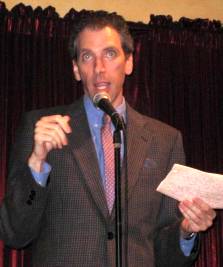
Barry in host mode
Your L.A. work has involved more than just acting, per se. You’ve hosted stand-up shows, right?
Yes, and I’ve also co-produced and hosted my own stage variety show that featured people that weren’t famous then but certainly are now: Jack Black, Steve Carell, Will Ferrell, Jane Lynch … among others. That experience was very special to me, since it was my baby and it meant so much to me. I also had such great support along the way. In fact, Jane was one of my co-producers.
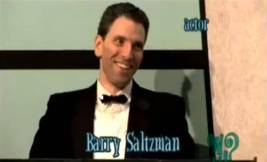
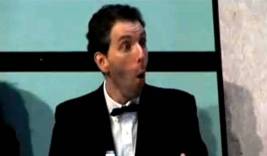
Panelist Barry on What’s My Line—Live On Stage.
You hold the record as the most frequent celebrity panelist on What’s My Line—Live On Stage.
I was so privileged to be a part of that experience. That was another instance, to me, of the universe validating me as a professional. If I am on the same stage with these people, something is working out right.
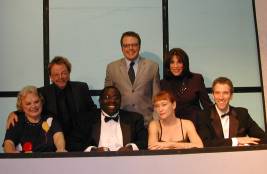
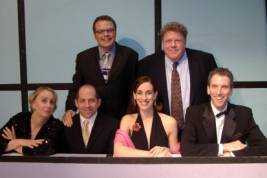
Barry (far right) with fellow panelist Rose Marie (far left) and celebrity guest Paul Williams (next to Rosie) on What’s My Line—Live On Stage. Also, George Wendt looms above Barry at another What’s My Line. Both photos feature What’s My Line host J. Keith Van Stratten top center.
Which celebrity guests were you most excited to meet when you took off the blindfold?
Nanette Fabray and Rose Marie come to mind. I couldn’t believe that on the first show I was a panelist on—and a last minute replacement to boot—that Nanette Fabray would be sitting opposite me. Just knowing whom she worked with and what she’s done and I’m a part of that history is just mind-blowing to me. When I saw these people as a kid, I didn’t imagine that I would share the stage with them. And to be treated as a peer, an equal, is amazing and exhilarating to me. When Rose Marie and I were panelists and looked at each other at one point and laughed at something in unison, I truly thought I must be dreaming. It was such an honor to work with her since I loved watching her on one of my favorite shows, The Dick Van Dyke Show.
Any other favorite celebrity guests?
Paul Williams was great. When I correctly guessed Camryn Manheim, that was very exciting. Fred Willard, George Wendt—that was fun and energizing to see them sitting across from us. And working with Dick Van Patten, Rip Taylor, Jayne Meadows, among others … Pinch me, truly!
One of your appearances on What’s My Line took place in its New York incarnation. Can you tell us a bit about that experience?
That was such a wonderful experience, too. My first New York credit; and off-Broadway, too. I didn’t think that was going to happen! I felt like a true professional, to be asked to do the first What’s My Line? in the New York incarnation. The show had an electricity and an energy that was palpable and that was so much fun and so exciting to be a part of. It was so validating to be a panelist with Betsy Palmer, Stephanie D’Abruzzo and Michael Riedel. To be accepted into that company and taken seriously. What a wonderful experience. And that show allows me to say that I love the energy and creativity of New York. I stayed there for a bit in ’08 and it’s a great place to be and soak up what the city has to offer.
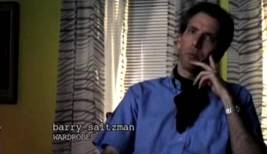
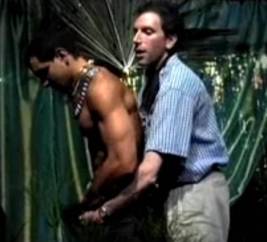
Barry in a pair of scenes from Danny Roane: First Time Director
You made your big screen debut in Andy Dick’s Danny Roane: First Time Director. What was it like for you working on this wild and crazy mockumentary?
It was an honor to be included in that cast, but it was nerve-wracking in a way, since on my first day, my monologue was filmed in front of comic heavyweights Michael Hitchcock, Mo Collins, and Andy himself. And that was another instance of me saying to myself, “If I can jump into the deep end of the pool and I do what I need to do to land my moments and beats in front of THIS group, I can do anything.”
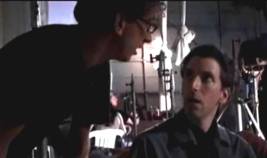
Andy Dick and Barry in a scene from Danny Roane: First Time Director
How was it working with your longtime friend Andy Dick?
I had a lot of fun and with Andy. He and I work really well together. I love that he has such a great editor’s mind. He knows how long a beat can be played, when it can take another turn, what needs to be cut. We seem to be on the same wavelength when we play together.
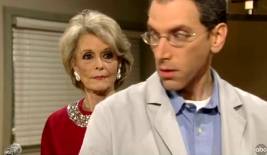
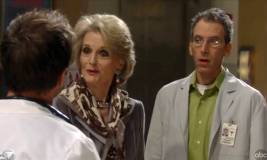
Barry in two scenes opposite Constance Towers on General Hospital
You became known to millions last year when you recurred on General Hospital, doing scenes opposite, among others, Miss Constance Towers. What special memories stand out for you about your soap opera stint?
That was another honor. To work with her was so special. She’s such a nice lady and she worked hard. I like that, since I think I do, too. And we ended up working well together.
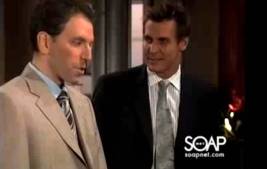
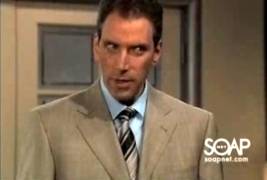
Barry (in a different role) opposite Ingo Rademacher on General Hospital
It must have been quite different for you working at a soap opera pace.
Soaps are hard work that demands us to be on our toes, focused, present and prepared. There is very little rehearsal and the scenes are shot very fast. It was good for me to focus on her, since I like to do that anyway, but in this case, it was good for me to get out of my head and my own nerves. It’s great training and it’s another instance of “If I can do this, I can do anything.” Also, being the show business historian that I am, I asked Miss Towers questions about some of the people she worked with and without missing a beat after one of our takes, she recounted tales about Yul Brynner, Margaret Hamilton, David Wayne and other theatrical luminaries. What a treat that was!
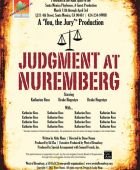
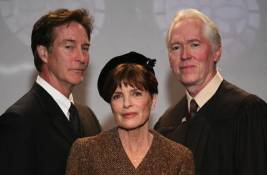 12
12
Barry’s Judgment At Nuremberg costars are Drake Hogestyn, Katharine Ross, and Ian Patrick Williams
Now of course you’re about to open in Judgment At Nuremberg, in the role which scored Montgomery Clift his final Oscar nomination. Any feelings about stepping into such esteemed shoes?
It’s an honor and privilege to play this part. I bow down to him in this movie and in all his work, since he’s one of my favorites. And this movie is one of my favorites, too, so it’s very exciting to me to be a part of this project.
How do you go about playing a role a major film star is famous for?
I can’t help stealing some bits of interpretation from Montgomery Clift, since he’s left an indelible mark on this part. It’s fun to use his great performance as a launching pad, but I do my best to make it my own. And it’s such a great, juicy part, so that’s so much fun to play, too.
One of your costars in Judgment is Katharine Ross, who will forever be remembered as Elaine in The Graduate and as Butch and Sundance’s gal pal in a pair of Hollywood classics. As a film connoisseur extraordinaire, any thoughts on working with Miss Ross?
Thank you for calling me that! She is so lovely and nice, as well as being down-to-earth. When another cast member said to her “I’m star-struck,” she replied, “I’ll soon disavow you of that.” What a wonderful response.
Have you been able to talk with Katharine Ross about the film luminaries she’s worked with?
I’ve asked her about some of her esteemed costars, and it was fun to talk with her about her impressions of Greer Garson, John Wayne, Laurence Olivier. After a while, she ended up volunteering anecdotes to me. This is another instance of working with someone who has played with these great people. What an honor and a treat for me as a show business aficionado.
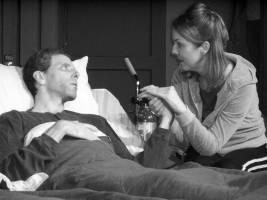
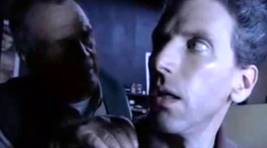
Barry (opposite Candice Martin) in his Scenie-winning role in Letting Go and on film (opposite Charles Howerton) in The Projectionist
You’ve been on a bit of a roll lately, with your work in one production after another, culminating with Judgment At Nuremberg. How would you like to see your career develop over the next few years, if you could have your druthers?
You’re kind to say so, thank you. I’ve been very fortunate to have worked a lot on a variety of plays and parts with terrific actors and directors. My aim is to continue to work and to keep learning about myself and about my craft while simultaneously increasing the levels and arenas of where I work. But I’m an actor and an actor works.
Thanks so much Barry for taking the time to talk with StageSceneLA!
Steven, thank you so much for this honor!
Barry Saltzman’s IMDB Page
Barry Saltzman’s YouTube Page
Click here for tickets to Judgment At Nuremberg
Barry Saltzman has appeared in the national tours of The Real Live Brady Bunch at the Kennedy Center and other venues. He also appeared as a recurring Panelist in What’s My Line? – Live On Stage at the Barrow Street Theatre off-Broadway and at ACME in L.A. with Nanette Fabray, Camryn Manheim, Rose Marie, George Wendt and Fred Willard, etc. Other L.A. stage credits include Creator/Host of The Beachwood Palace Jubilee at ACME and other theatres with Jack Black, Steve Carell, Jon Favreau, Will Ferrell and Jane Lynch, etc., Letting Go at the Raven Playhouse (StageSceneLA’s Outstanding Featured Actor: Drama), Amadeus (Ovation nomination: Best Season, StageSceneLA’s Best Production: Drama and Outstanding Acting In An Ensemble Cast: Drama) Breaking The Code (StageSceneLA’s Best Ensemble: Drama) and Mrs. Warren’s Profession at The Production Company, Twelfth Night, The Two Gentlemen Of Verona and The Resistible Rise of Arturo Ui with Classical Theatre Lab, The Lark and De Profundis at Company Of Angels, The Limitations Of Genetic Technology at Theatre of NOTE, Screwballs at the Odyssey Theatre, Meditations: Eva Hesse at Highways and The Shadow Box at the Attic Theatre. Television credits include recurring and supporting roles on General Hospital and film credits include Danny Roane: First Time Director, Through The Air To Calais…, The Studio Of Tomorrow, Slight, Recovery, and The Projectionist. Barry, a Chicago native, is an Indiana University graduate.

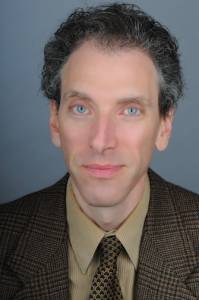

 Since 2007, Steven Stanley's StageSceneLA.com has spotlighted the best in Southern California theater via reviews, interviews, and its annual StageSceneLA Scenies.
Since 2007, Steven Stanley's StageSceneLA.com has spotlighted the best in Southern California theater via reviews, interviews, and its annual StageSceneLA Scenies.







 COPYRIGHT 2024 STEVEN STANLEY :: DESIGN BY
COPYRIGHT 2024 STEVEN STANLEY :: DESIGN BY